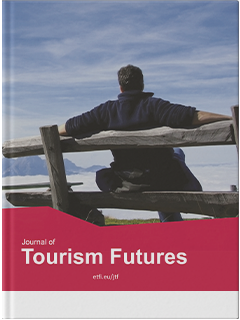Gender equality boost for regenerative tourism: the case of Karenni village Huay Pu Keng (Mae Hong Son, Thailand)
IF 5.8
Q1 HOSPITALITY, LEISURE, SPORT & TOURISM
引用次数: 3
Abstract
PurposeThis paper display how “objectifying” forms of tourism can be converted into a more gender-equal regenerative tourism.Design/methodology/approachThe methodology generates shared understandings about the opportunities and challenges of implementing regenerative tourism by stimulating gender equality. The research design is based on qualitative research methods. Using a transformative tourism development process of the Karenni village Huay Pu Keng in Thailand, which is the first and only village that made this transition, the results of a process to stimulate the empowerment of women have been described.FindingsThe desk research and conversations reported in the findings of this paper provide important insights in the social impacts in relation to gender equality and women empowerment. The community has become a role model for transformative tourism in relation to gender equality. Findings included that women are more involved in tourism activities, which has created a positive shift towards a gender balance. However, there is still a difference in education and participation between men and women. The study further reveals how tourism contributes to enliven the indigenous traditions and cultures and be a model for future developments in creating life-long meaningful experiences.Originality/valueInsights of the first and only Karenni village that made a transition to community-based tourism demonstrate how the community has been empowered. It improved the gender balance to make strategic decisions towards transforming their futures. Exploring this process is therefore valuable, as it contains knowledge that can be advantageous for other communities and research.性别平等促进再生旅游:以泰国梅洪森Karenni村Huay Pu Keng为例
本文展示了如何将“客体化”的旅游形式转化为更性别平等的再生旅游。设计/方法/方法该方法产生了关于通过促进性别平等来实施再生旅游的机遇和挑战的共同理解。研究设计基于定性研究方法。泰国的Karenni村Huay Pu Keng是第一个也是唯一一个实现这一转型的村庄,通过这一转型的旅游发展过程,本文描述了促进妇女赋权过程的结果。研究结果本文的研究结果中报告的桌面研究和对话提供了与性别平等和妇女赋权相关的社会影响的重要见解。该社区已成为与性别平等有关的变革旅游业的榜样。调查结果包括妇女更多地参与旅游活动,这为性别平衡创造了积极的转变。然而,男女之间在教育和参与方面仍然存在差异。该研究进一步揭示了旅游业如何有助于活跃土著传统和文化,并成为未来发展中创造终身有意义体验的典范。原创性/价值对第一个也是唯一一个过渡到以社区为基础的旅游的克伦尼村的见解表明,社区是如何被赋予权力的。它改善了性别平衡,以便为改变她们的未来做出战略决策。因此,探索这一过程是有价值的,因为它包含了对其他社区和研究有益的知识。
本文章由计算机程序翻译,如有差异,请以英文原文为准。
求助全文
约1分钟内获得全文
求助全文
来源期刊

Journal of Tourism Futures
HOSPITALITY, LEISURE, SPORT & TOURISM-
CiteScore
15.70
自引率
6.00%
发文量
64
审稿时长
34 weeks
期刊介绍:
 求助内容:
求助内容: 应助结果提醒方式:
应助结果提醒方式:


